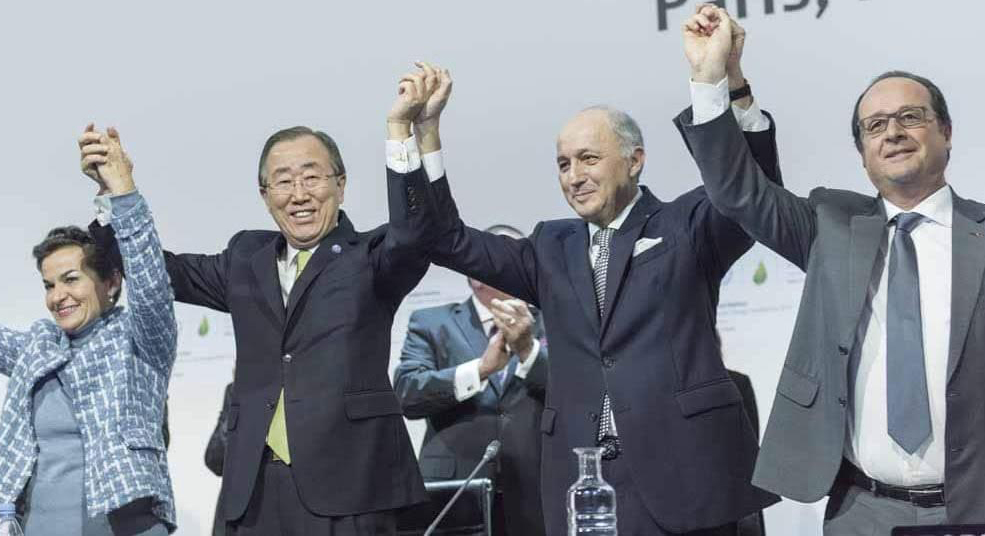
African countries are frustrated with Western governments’ hypocrisy and refusal to take responsibility for the climate change crisis. But victim countries like Nigeria are not better in their fidelity to the accord, CHINEDUM UWAEGBULAM writes.
When African political and business leaders recently proposed new global taxes on polluters to help fund climate change action that will form the basis of their negotiating position at November’s COP28 summit, they were voicing their deep frustration at the developed countries’ unwillingness to implement the Paris Agreement.
They demanded a reform to the multilateral financial system and global financial architecture; for world leaders to rally behind a global carbon taxation regime, and for the establishment of a new financing architecture that is responsive to Africa’s needs including debt restructuring and relief, as well as establishment of a new Global Climate Finance Charter.
Leading the call is the Committee of African Heads of State and Government on Climate Change (CAHOSCC) chair, Kenyan President William Ruto, who alluded to the hypocrisy of western countries and failure to take responsibility in tackling climate change.
He noted that the rapidly growing African continent of more than 1.3 billion people is losing five to 15 per cent of its gross domestic product growth every year to the widespread impacts of climate change, while it contributes by far the least to global warming.
While urging the developed countries to keep their promises, Ruto lamented that pledges by richer nations of $100 billion fund for climate adaptation and mitigation to help developing nations achieve their climate goals remains unfulfilled.
The Paris Agreement concluded at COP21 goes further than the much-discussed target of capping the global temperature increase at 2°C above pre-industrial levels, but states that the aim is to keep the increase “well below 2°C,” with an effort to cap it at 1.5°C. The agreement features pledges on greenhouse-gas emissions from developing countries, in exchange for which they will receive huge sums of cash from richer countries.
Currently, the global community is not ready to replace fossil fuels with solar and wind sources as the International Energy Agency estimates that the world paid $84 billion to subsidise solar and wind power last year, and it expects that 25 years from now, $84 billion yearly subsidies are needed.
The reality is already here and the situation is worsening with altered Europe’s energy supplies due to Russian invasion of Ukraine. Campaigners are accusing European governments of seeking to exploit the fossil fuel reserves of the developing world, especially in Africa, while failing to help them tackle the climate crisis.
With the energy crunch, countries are not only reopening coal plants on the continent, but actively looking to develop new sources of fossil fuel abroad – including in low-income countries where they had previously worked to block investments in the sector.
The United Kingdom vehemently denounced fossil fuels at the Glasgow climate summit; keep coal-fired plants instead of shutting almost all of them as previously planned. Thermal coal imports by the European Union from Australia, South Africa and Indonesia increased more than 11-fold.
There is also a new trans-Saharan gas pipeline will allow Europe to tap directly into gas from Niger, Algeria and Nigeria; Germany is reopening shuttered coal power plants and in talks with Senegal on helping the West African nation exploit its offshore natural gas resources for export to Europe – with the first shipment likely in 2024; France and Italy are planning to import 40 per cent more gas from northern Africa. And the United States is going cap-in-hand to Saudi Arabia to grovel for more oil production.
The State of the Climate in Africa 2022 report shows that the rate of temperature increase in Africa has accelerated in recent decades, with weather- and climate-related hazards becoming more severe. And yet financing for climate adaptation is only a drop in the ocean of what is needed.
More than 110 million people on the continent were directly affected by weather, climate and water-related hazards in 2022, causing more than $8.5 billion in economic damages. There were a reported 5,000 fatalities, of which 48 per cent were associated with drought and 43 per cent were associated with flooding, according to the Emergency Event Database. But the true toll is likely to be much higher because of under-reporting.
“Africa is responsible for less than 10 per cent of global greenhouse gas emissions. But it is the continent which is the least able to cope with the negative impacts of climate change. Heatwaves, heavy rains, floods, tropical cyclones, and prolonged droughts are having devastating impacts on communities and economies, with increasing numbers of people at risk,” said WMO Secretary-General, Prof. Petteri Taalas.
“Given Africa’s high exposure, fragility and low adaptive capacity, the effects of climate change are expected to be felt more severely. People’s health, peace, prosperity, infrastructure, and other economic activities across many sectors in Africa are exposed to significant risks associated with climate change,” she said in the report.
Projected yearly food imports by African countries are expected to increase by about a factor of three, from $35 billion to $110 billion by 2025. The level of loss and damage, and therefore the costs incurred, will depend on many factors, including the level of ambition of global mitigation actions and the level of investment in adaptation at the local level.
In a 4 °C warming world, with strong regional adaptation, “residual damages” costs equivalent to three per cent of Africa’s projected gross domestic product could be incurred yearly by 2080. The loss and damage costs in Africa due to climate change are projected to range between $290 billion and $440 billion, depending on the degree of warming, according to the UNECA’s African Climate Policy Centre.
“Africa accounts for just four per cent of global emissions. Yet it suffers some of the worst effects of rising global temperatures: The people of Africa — and people everywhere — need action to respond to deadly climate extremes. I’m convinced that Africa can be at the heart of a renewable future. Now is the time for all countries to stand as one in defence of our only home,” said UN Secretary-General António Guterres.
A former policy analyst and economist, Centre for Global development and National Bureau of Statistics in Nigeria (NBS) Euan Ritchie, said at COP26, a group of donor countries pledged no more development finance would be provided for fossil fuels of any type. “While this was celebrated by some activists, it sits uneasily with the continued use of fossil fuel from the same countries, not to mention current plans to allow further drilling for oil in the Gulf of Mexico.
“This hypocrisy has been noticed by several leaders of the Global South. These high-income donor countries could have a greater impact by pledging to eliminate their own fossil fuel use. This would also save a lot more money. These countries collectively spent around $56 billion on subsidising production or consumption of fossil fuels, whereas stopping development finance for fossil fuel projects will reportedly save $19 billion. It may be politically more difficult, but climate action should begin at home,” he said.
This hypocrisy has greatly impacted Nigeria as an oil producing country and party to the agreement in 2017. The country committed to cutting its carbon emissions unconditionally by 20 per cent or conditionally by 45 per cent with international support by 2030 under the revised Nationally Determined Contributions (NDCs).
It targets ending gas flaring by 2030, make for efficient gas generators, ensure 30 per cent energy efficiency by 2030 (two per cent per year), adopt transport shift from cars to bus, improve electricity grid and engage in climate smart agriculture and reforestation. It also plans to ensure conversion from cooking fuels such as kerosene and charcoal to eco-friendly cooking gas and efficient wood stoves.
However, meeting these targets has been a cause for concern as the country is yet to harmonise its policies and programmes among the federal ministries, despite establishing the National Council on Climate Change (NCCC). The rate of deforestation has been alarming as forests serve as carbon sinks and have the ability to absorb carbon dioxide from the atmosphere. The World Bank rated the country among the top seven on gas flaring countries, while it ranks high in the production and export of charcoal.
The Director, Health of Mother Earth Foundation (HOMEF), Nnimmo Bassey, told The Guardian, “The NDC is one of the worst mistakes of the agreement. It has been demonstrated that if all nations meet their proposed contributions the world will warm way above the 1.5 or the below 2.0 C temperature targets. The question for me is why the world would not revert to the key justice basis of the UNFCCC, the Common but Differentiated Responsibilities (and capabilities).
“The agreement should be reviewed to require that rich polluting nations do their fair share of emissions reduction. False climate solutions should be deleted from the PA and issues like carbon trading, carbon offsetting and other elements that point towards green colonialism. We need real emissions cuts, not fictional gymnastics.”
According to him, it is possible to cut emissions in Nigeria, “halting routine gas flaring is something that is doable and that will cut millions of tonnes of greenhouse gases. Investing in mass transit would cut emissions, while supporting agroecology would rebuild our soils and sequester carbon. Halting deforestation is another way and the switch to distributed renewable energy supply systems.”
Director, Centre for Climate Change and Development, Alex Ekwueme Federal University, Ndufu-Alike Ikwo, Ebonyi State, Prof. Chukwumerije Okereke, expressed concern on the recent report by Intergovernmental Panel on Climate Change (IPCC) that emissions have continued to rise across all sectors, even though the scale of rise are not as high as in previous decades.
“It implies that countries are not on course to meet the agreement. This is a major worry. Nigeria is not an exception, although, there has not been a significant robust analysis to the extent the country has met its NDC. Preliminary analysis suggests that Nigeria is not on course. The challenge is that there have been limited efforts to translate the NDC, the long-term vision, strategy and net zero plans into action.
“What’s required is the massive renewable energy investments and immediate cessation of gas flaring in the Niger Delta region, which has not happened, What should happen is massive reforestation and afforestation to help sequester carbon from the atmosphere. The tripling of renewable energy investment can also help reduce the issue of the use of diesel generators, which is a major contributor to greenhouse emissions in Nigeria.
“It is vital we deal with the issue of the traditional cooking stove being used by millions of Nigerians to cook. This not only contributes to deforestation, it is also a major source of pollution and health crisis for our women. It is also important to prioritise the manufacture, distribution of improved cooking stoves and electrification of the country to reduce the health burden on women and our forests.”
Prof. Emmanuel Nzegbule of the Michael Okpara University of Agriculture, Umudike, Abia State, warned against policy inconsistency, such as the lifting of ban on charcoal export.






